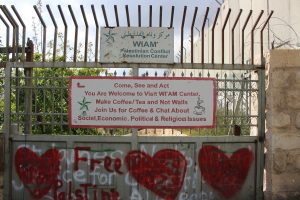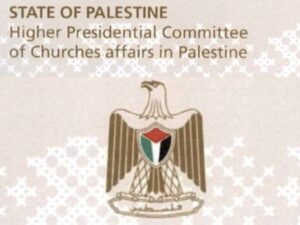Wi’am – Occupying space with courage, resilience and humanity

It was my first time in Israel and Palestine. From April 1-10, I joined a Canadian delegation, which included representatives from the United Church of Canada and the Presbyterian Church in Canada, to visit partners in the region and finally meet people I’ve been corresponding with for years. I have always been impressed by our partners’ courage, resilience and humanity. I was even more impressed after meeting them and witnessing their day-to-day reality.
Nothing prepared me for the occupation. No research or previous experience in countries engulfed in militarized conflict and repression could have done so. What makes the situation incomprehensible is the number of walls, check points, human and financial resources, and military machinery invested in the occupation. It’s not only the physical and military infrastructure, it’s the unfathomable and arbitrary rules and regulations governing permits and checkpoints that, for example, determine that a farmer can use only one check point location during a very limited period in the morning and in the afternoon to travel to his fields on the other side. For Palestinians these are all constant and daily reminders that they live under occupation. For Israelis these reminders exist in the form of signs outside Palestinian villages, warning them that it is illegal and dangerous to enter these villages, perpetuating hatred, fear and misunderstanding that drive the occupation.
Despite these structures of dehumanization, there is incredible humanity and resilience on all sides.
KAIROS partner Wi’am: Palestinian Conflict Transformation Centre is an example of that humanity. The offices, located in Bethlehem, are a literal testament of this resilience in the face of occupation. Their courtyard and playground back on to the wall.
Yet the offices and grounds of Wi’am endeavours to be a space free of the occupation, a space where children from Bethlehem and the nearby refugee camps can participate in Easter egg hunts and summer camps. It’s a space where women can meet, talk about violence in Palestinian society, and learn about their rights. It’s a place where Palestinian communities can learn about reconciliation, talk about conflict resolution, and imagine a life that is not under occupation.
I was thrilled to see Lucy Talgieh, coordinator of women and children’s programs at Wi’am. I had accompanied her during a Women of Courage tour to Canada in 2011. She is the same vivacious, defiant and courageous Lucy, with a quick wit and contagious laughter.
Sitting in the courtyard, Lucy told us about Wi’am’s work with Palestinian women to end violence against women within Palestinian society. Unfortunately, as Lucy explained, the occupation has resulted in increased violence against women. Wi’am offers very concrete community-based programs for women including income generating projects, legal training and workshops on laws that protect their rights. Wi’am also works to improve the penal code. They run a women’s shelter and a women’s club to socialize and discuss problems. In the summer, they run a camp and their playground, which backs on to the separation wall, is overrun with 120 to 150 children from Bethlehem and the nearby refugee camp,
Wi’am also works internationally, to raise awareness about the impacts of the occupation on women and to increase their participation in efforts to end it and build sustainable peace. Lucy spoke about Wi’am’s work with United Nations Security Council Resolution (UNSCR) 1325. She explained that there are many UN resolutions related to Palestine, and Palestinians have become somewhat disillusioned with their effectiveness. Despite this, Wi’am decided to “grab” UNSCR1325 because it applies specifically to women and their role in peace building at local and international levels, work that Wi’am is already doing. Wi’am has been involved in building awareness about this resolution at a grassroots level. They are also members of a network of women’s groups which very recently developed a National Action Plan (NAP) for Palestine on the implementation of UNSCR1325.
I shared with Lucy that KAIROS is part of the Women, Peace and Security Network (WPS-N) in Canada and that we are working on a new action plan. She offered encouragement, saying that the results would be important to the Canadian government and organizations, but also to all international partners because it would serve as a tool to measure effectiveness and accountability on issues related to women, peace and security.
Lucy, like me, fondly remembers the Women of Courage tour in 2011. She said it changed her life. Lucy travelled with Claudia, a Colombian partner from the Organizacion Femenina Popular (OFP). Before the tour Lucy said she knew nothing about Colombia. Now she follows the peace process in that county and remains in touch with Claudia. She also continues to correspond with those members of the KAIROS network who hosted her during her tour through Nova Scotia and Newfoundland. Some of the network members have since visited her in Bethlehem.
After the tour in the Atlantic region, Lucy travelled with Claudia as an international witness to the Truth and Reconciliation Commission (TRC) national hearings in Saskatoon. She said this experience had the most profound impact on her and that it broke her heart. She said at first she had trouble speaking about it when she returned to Palestine but now, she says, it has increased her resolve to work for peace and reconciliation.
When I asked her what her message to Canadians was she said: “Canadians need to wake up their hearts and minds to be pro-humanity (not pro-Israeli and not pro-Palestinian) and to ask their government to stop trying to manage the conflict in Palestine and Israel, but instead to resolve it.”
After Bethlehem, we travelled to Tel Aviv to meet with the Coalition of Women for Peace (CWP), an example of resilience and humanity on the other side of the wall. CWY is a coalition of Israeli and Palestinian women’s groups. Their aim is to end the occupation from the Israeli side by bringing Israeli women across the wall through the check points to Palestine and educating women in Israel about the occupation in a context where this reality is invisible. And they do this at tremendous risk. There is no sign for the organization outside the building, the doors to the office are fortified and they do not leave their office alone in the evening. They could lead a very comfortable life, accept the occupation and close their eyes to the suffering of Palestinians, but they choose not to.
Despite staggering resources, monstrous infrastructure and enormous military might that perpetuate the occupation, humanity and solidarity persists on both sides of the wall.. It’s an honour to support these efforts.







